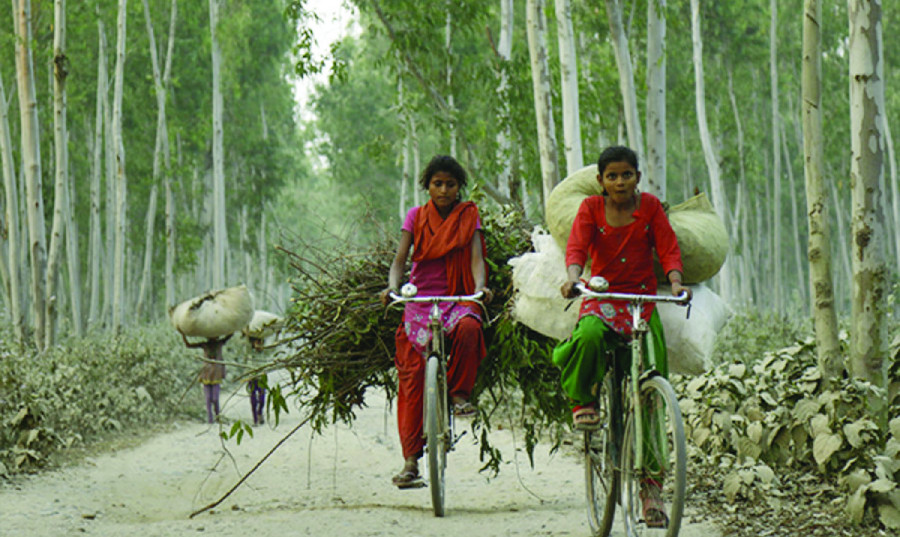Climate & Environment
Community forest user groups lambast government for not addressing concerns
They had hoped the government would resolve their outstanding issues of tax and PAN through new budget.
Chandan Kumar Mandal
Community forest users’ groups have slammed the government for failing to address their outstanding concerns through the new budget.
The community forest promoters have said that the government, which unveiled its budget for the fiscal year 2021-22 last Saturday, did not care to relax obstacles in promoting forest-based enterprises despite frequent requests.
According to Bharati Pathak, chairperson of the Federation of Community Forestry Users’ Nepal, the umbrella organisation of over 22,000 community forest groups in the country, the programme and policies as well as the latest budget show that the community forestry is not on the government’s priority list.
“There had been some prominent issues, which are crucial for empowering community forestry and promoting forest-based industries in communities, and should not have been left out in the new budget,” said Pathak. “We had been discussing the matter with the concerned agency over and over again. The government should have cleared out the issues that have been creating obstacles to community forest in the budget.”
Community forest groups have long been demanding that the government relax the 25 percent tax on their annual income and make the process of obtaining the personal account numbers (PAN). They say that they are already burdened with heavy taxes imposed by all three tiers of the government.
According to them, levying 25 percent tax on their annual income, which is already limited and spent on various activities at the community level, can affect their conservation activities and forest-based industry promotion.
“The government has failed to recognise the collective efforts of the community. The latest budget has given priority to private sectors but created obstacles for community forest groups in utilising its resources through collective efforts,” said Pathak.
The Federation of Community Forestry Users’ Nepal (FECOFUN), which is celebrating its 25 years of contribution to forest and biodiversity conservation, also feel discriminated against as the new budget offers various tax waivers and relief schemes to private sectors while the forestry sector has been entirely ignored.
As per the Forests Act, 2019, community forests users’ groups should spend at least 25 percent of their annual income on development, protection and management of the forest, and at least 25 percent of the remaining amount in poverty alleviation, women empowerment and entrepreneurship development activities, in coordination with the concerned local government.
“Community forests are slapped with an income tax, whereas the private sector has got a tax waiver and a favourable environment to work,” Pathak said. “Community forests, which have already been spending a majority of its income on various activities like forest development and income generation, are being asked to pay income tax even before such activities are carried out in the community.”
Community forest groups have long been criticising the backbreaking taxation policy by the local, provincial and federal governments. Different enforced and proposed taxes by all three layers of the governments had once totalled up to 90 percent of their annual transactions.
After a massive lobby against such financial burden, the government last year had waived off 15 percent tax imposed on community forest users’ groups on the sale of Saal (Shorea robusta) and Khayar (Acacia catechu) timbers. However, the rest of the issues were left unresolved.
“Even this year, we had reached out to the concerned government agencies with our concerns and they had pledged to address them. While the government offered various financial relief to other sectors, the community forest sector was overlooked,” Pathak said.
Nepal’s locally managed community forests have garnered worldwide acclaim as a successful model of conservation for not only protecting forests and biodiversity but also for recovering the country’s green coverage and lifting people out of poverty. Forest-based industries run by such groups have been a reliable source of income for many families.
Dil Raj Khanal, legal advisor to FECOFUN, said the Forests Act has given ample opportunities for community forest users’ groups to run forest-based enterprises.
“However, provisions like the 25 percent tax on annual income means a bigger portion of their earnings is going to tax, while only a small amount is allocated for forest conservation and income generating activities.”
Another concern raised by community forest users’ groups is the rule of obtaining PAN by all community forest users.
They say the issue of getting PAN has been complicated because they have been asked to furnish the details of financial transactions of the past several years.
Just three days into the budget announcement, and the division forest offices have already written to community forest groups to obtain PAN, Pathak said.
“If any individual wants to get a PAN for a private enterprise, they can easily get it in one day. In contrast, community forests are not only asked to provide financial reports of the past 5 to 10 years, but also pay those taxes,” Pathak said. “Community forest groups from different parts of the country have been asked to pay tens of thousands of rupees in order to receive PAN.”
In one instance, a community forest group was asked to pay Rs100,000 as outstanding income tax when they applied for PAN, which was needed to finalise the clearance of merely Rs 12,000 with a local forest office, said Pathak.
Community forest groups have demanded that the government should only ask for the financial transaction of the year they applied for PAN.
“At a time when there are limited opportunities, community forest users’ groups want to run their own enterprises. However, the PAN issue has stood out as a major hurdle. The government’s slogan is ‘Prosperous Nepal, Happy Nepali’ but the hassles community forests are facing show that the government actually wants to tie our hands,” Pathak said. “We have long been raising these issues and had high hopes that they would be addressed in the new budget. By disregarding our concerns, the government has disrespected more than 22,000 community forest groups.”




 13.12°C Kathmandu
13.12°C Kathmandu











